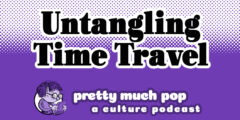
Time-travel rules in The Terminator franchise are notoriously inconsistent. Is it possible for someone from the future to travel backwards to change events, given the paradox that with a changed future, the traveler wouldn't then have had the problem to try to come back and fix? Neither the closed-loop series of events in the first Terminator film nor the changed (postponed) future in the second make sense, and matters just get worse through the subsequent films.
Mark Linsenmayer, Erica Spyres, and Brian Hirt are joined by Brian's brother and co-author Ken Gerber to talk through the various time travel rulesets and plot scenarios (a good starter list is at tvtropes.org), covering Dr. Who, Back to the Future, Looper, Dark (the German TV show), time loop films a la Groundhog Day (Edge of Tomorrow, Happy Death Day), time-travel comedies (Future Man), historical tourism (Mr. Peabody and Sherman), Timecop's "The same matter cannot occupy the same space," using time-travel to sentimentalize (About Time) or clone yourself (see that Brak Show episode about avoiding homework), and freezing time (like in the old Twilight Zone).
Some articles we looked at included:
- "A History of Time Travel Fiction" by Jeremy Gordon
- "The 30 Best Time Travel Movies" by Darren Orf
- "Time Travel: Theories, Paradoxes & Possibilities" by Elizabeth Howell
- "Let's Unravel the Time Travel Paradox of Terminator: Dark Fate" by Angela Watercutter
- "Why Are We So Interested In Time Travel?" by Steve Paulson interviewing James Gleick
- "Time Travel Probably Isn't Possible—Why Do We Wish It Were?" by Simon Worrall, again with Gleick
You can find the Brian and Ken short stories we talk about at gerberbrothers.net. Listen to them podcast together and read the science fiction stories they publish at constellary.com. The Partially Examined Life podcast episode Mark hosted where the dangers of AI are discussed is #108 with Nick Bostrom.
This episode includes bonus discussion that you can only hear by supporting the podcast at patreon.com/prettymuchpop. This podcast is part of the Partially Examined Life podcast network.
Pretty Much Pop: A Culture Podcast is the first podcast curated by Open Culture. Browse all Pretty Much Pop posts or start with the first episode.
Pretty Much Pop #22 Untangles Time-Travel Scenarios in the Terminator Franchise and Other Media is a post from: Open Culture. Follow us on Facebook, Twitter, and Google Plus, or get our Daily Email. And don't miss our big collections of Free Online Courses, Free Online Movies, Free eBooks, Free Audio Books, Free Foreign Language Lessons, and MOOCs.
from Open Culture https://ift.tt/2LFVmFV
via Ilumina
Comments
Post a Comment